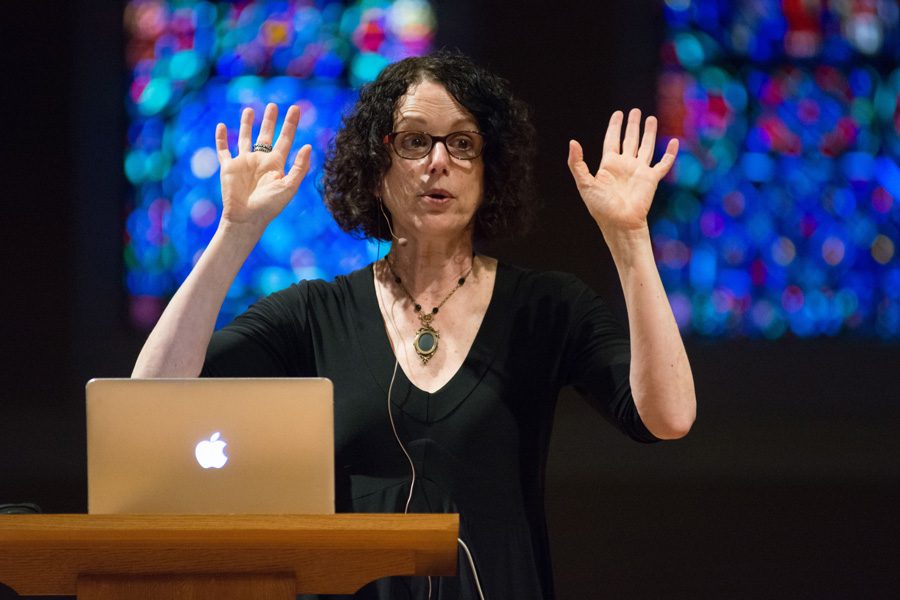Keynote speaker addresses white privilege at YWCA’s first Racial Justice Summit
Lauren Duquette/The Daily Northwestern
Robin DiAngelo speaks about white privilege, asking white audience members to be open to criticism. DiAngelo was the keynote speaker at the YWCA Evanston/North Shore’s first Racial Justice Summit.
May 6, 2016
Robin DiAngelo remembered being able to clearly observe racism in her community, but her feelings of inferiority kept her from speaking up.
DiAngelo said she grew up in poverty, worrying about having enough food to eat as she went through the cycle of homelessness and the foster care system. One day, she said she realized her silence was “maintaining white solidarity,” that her silence was “colluding with racism.”
So DiAngelo, the director of equity for Sound Generations, a nonprofit that helps senior citizens in the Washington area, dedicated herself to combatting racism with her educational background in white racial identity and race relations, she said. Thursday evening, DiAngelo urged white individuals to open their minds to an honest appraisal of their internalized superiority and racial privilege at the YWCA Evanston/North Shore’s first Racial Justice Summit.
More than 50 people gathered at Garrett-Evangelical Theological Seminary, 2121 Sheridan Road, for the “Mirrors and Methods: Tools for Creating Racial Equity” summit to hear DiAngelo’s keynote speech.
“I want to draw your attention to the fact that I’m white, so check it out,” DiAngelo said. “Very seldomly are white people asked to look in the mirror at themselves. And when I looked in the mirror, I would see many things about myself but that I was white was not one of them.”
People will have the chance to explore how to combat racism with the help of additional speakers and facilitators in breakout sessions Friday, Eileen Heineman, co-director of racial justice programs at the YWCA, told The Daily.
The summit will also feature keynote speaker Brittney Cooper, an assistant professor of Women’s and Gender Studies and Africana Studies at Rutgers University. About 175 individuals signed up to attend the summit over the course of the two days. It was created to encourage collective action that would eventually change the “system of racism,” Heineman said.
DiAngelo said her speech was an address primarily to the white individuals in the audience to help them better understand the issues people of color face and the inherent privilege they may not notice in themselves.
She countered dominant white racial narratives such as the phrases “I was taught to treat everyone the same” and “This happened regardless of race,” and said the “racism is bad” attitude that permeates modern society makes white people defensive when confronted with in-depth conversations about racism.
DiAngelo also talked about how children pick up on the message that it is better to be white and how, even today, people of color are very underrepresented on boards of major institutions, including the U.S. Supreme Court.
“I’ve devoted my life to anti-racist work,” DiAngelo said. “But I do not call myself an anti-racist, and I do not call myself an ally. That is for people of color to decide.”
Audience members mainly questioned how to stop conceptualizing solutions and start taking action against racism.
“(DiAngelo) had some insights that, as an African American, wouldn’t have occurred to me because I have an African American lens,” Carmen Corbett, a member of the YWCA board, told The Daily. “If we’re ever going to get to a better place, we all have to be able to get in the other person’s skin. It’s important for me … to go to the extent that I can to try to understand what they don’t understand.”
Email: [email protected]
Twitter: @rdugyala822


